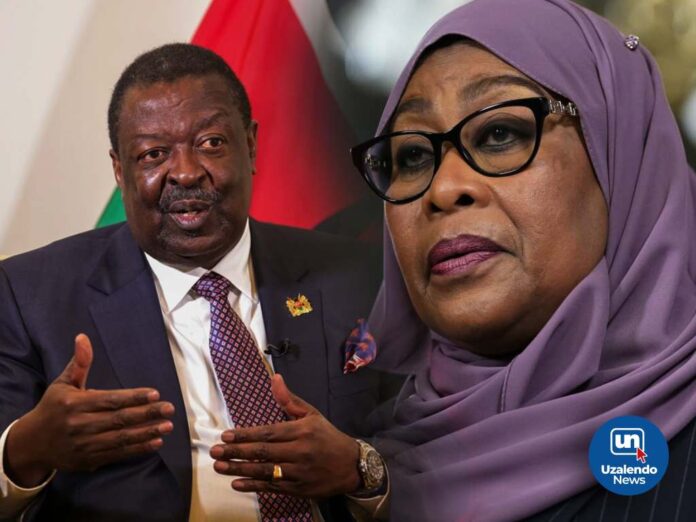Prime Cabinet Secretary and Foreign Affairs CS Musalia Mudavadi has defended Tanzanian President Samia Suluhu Hassan over her controversial remarks, saying there’s “some truth” in her assessment of Kenyans’ conduct.
Speaking during an appearance on Citizen TV’s The Explainer Show, Mudavadi acknowledged that while freedom of speech is a constitutional right in Kenya, the way it’s sometimes exercised has led to a decline in etiquette and integrity—a concern he believes Suluhu was referencing.
“I will not protest that (Suluhu’s remarks) because I think there is some truth,” Mudavadi said.
“The level of etiquette, insults, that we see in Kenya, even though we have the freedom of speech, is sometimes going overboard.”
Pressed on why his ministry did not proactively defend the deported Kenyans—among them Martha Karua, Gloria Kimani, Lynn Ngugi, Willy Mutunga, and Boniface Mwangi—Mudavadi remained cautious, saying the ministry needed time to verify details.

“She (Suluhu) is speaking from a general viewpoint. I am not talking about the individuals in question. But we also have to ask ourselves whether our conduct as a nation, broadly, has been decent.”
Mudavadi stressed that despite the East African Community’s (EAC) commitment to regional integration and movement, sovereignty still reigns. He maintained that Suluhu had a right, as a head of state, to protect her country’s interests—even if her approach rattled regional norms.
“The Jumuiya (EAC) has not taken away the sovereignty of the states. A country will make certain decisions. It is now the duty of diplomatic channels to investigate and engage.”
Activists Held, Tanzania Accused of Repression
The incident has triggered outrage from Kenyan civil society and human rights groups after Tanzanian authorities detained and deported prominent figures attempting to observe the treason trial of opposition leader Tundu Lissu.
President Suluhu on Monday warned against “foreign interference”, accusing regional activists of attempting to “destabilize” Tanzania.
“Let us not give them the chance. They have already destabilised their countries, and the only remaining peaceful nation is Tanzania,” she said in a televised address.
The remarks have stirred debate across East Africa, with some accusing Suluhu’s government of authoritarian overreach, while others—including Mudavadi—say activism should come with responsibility.
The fate of Boniface Mwangi, still detained in Tanzania, remains uncertain as diplomatic pressure builds on Dar es Salaam to explain the detentions and respect regional protocols on human rights and freedom of movement.


















